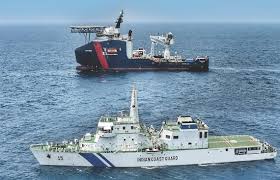Indian Coast Guard to Hold ‘SAREX 24’ in Kochi from Nov 27-30 (GS Paper 3, Defence)

Context
- The Indian Coast Guard (ICG) is all set to conduct the 11th edition of the National Maritime Search and Rescue Exercises & Workshop (SAREX-24) in Kochi from November 27 to 30, 2024.
- This significant event, organized under the auspices of the National Maritime Search and Rescue (NMSAR) Board, aims to enhance India’s maritime Search and Rescue (SAR) capabilities through a collaborative approach, involving both national and international stakeholders.
Key Details of SAREX-24
- Event: SAREX-24 (National Maritime Search and Rescue Exercises & Workshop)
- Dates: November 27 to 30, 2024
- Location: Kochi, India
- Inaugural Speaker: Rajesh Kumar Singh, IAS (Defence Secretary)
- Main Focus: Enhancing SAR capabilities through regional collaboration
- Lead Organizer: Indian Coast Guard (ICG)
Objectives and Themes
- The main objectives of SAREX-24 are to validate India’s National Maritime Search and Rescue (M-SAR) framework, which coordinates the country’s SAR efforts.
- The exercise will focus on regional collaboration to enhance SAR capabilities and improve operational responses during maritime contingencies.
- The key theme for the event is: “Enhancing Search and Rescue capabilities through Regional collaboration”.
- The exercise underscores ICG's commitment to providing assistance during maritime emergencies, regardless of location, nationality, or circumstances.
- This includes improving coordination among national agencies and international partners to ensure a swift and effective response to maritime disasters.
Key Activities at SAREX-24
Workshop and Seminars (November 28, 2024)
- On the first day, the event will feature table-top exercises and seminars.
- These sessions will involve senior officials from government agencies, ministries, armed forces, and foreign delegates.
- The focus will be on collaborative planning and sharing best practices for SAR operations.
Sea Exercise (November 29, 2024)
The second day will see a large-scale sea exercise off the Kochi coast. Two major maritime contingencies will be simulated:
- Scenario 1: A distressed passenger vessel carrying 500 passengers.
- Scenario 2: A civil aircraft ditching with 200 passengers.
This exercise will demonstrate the use of modern SAR technologies and operational strategies, including:
- Satellite-aided distress beacons for communication.
- Drones for deploying life buoys in emergency situations.
- Air-droppable life rafts to assist in evacuation.
- Remote-controlled life buoys for facilitating rescues.
Participant Agencies
A range of national and international stakeholders will participate in the exercise:
- Indian Coast Guard (ICG)
- Indian Navy
- Indian Air Force (IAF)
- Cochin Port Authority (for managing passenger vessel and tug operations)
- Customs Department
- Foreign Delegates from littoral regions and friendly foreign countries
Significance of SAREX-24
- SAREX-24 is a critical exercise for testing the coordination and efficiency of large-scale SAR operations at sea.
- The exercise will focus on improving cooperation between national agencies such as the ICG, Navy, and Air Force, as well as international stakeholders.
- It aims to strengthen maritime safety and enhance disaster response strategies across India’s vast 4.6 million square kilometer Search and Rescue Region (ISRR).
- This event plays a key role in ensuring that India is prepared to handle maritime emergencies and disasters with high efficiency, while also promoting regional cooperation for better maritime safety across the Indian Ocean and beyond.
Conclusion
- SAREX-24, organized by the Indian Coast Guard in Kochi, represents an essential step in advancing India’s maritime search and rescue capabilities.
- By involving various national and international stakeholders, this exercise will test and improve the coordination needed to respond to large-scale maritime emergencies.
- The incorporation of modern technology and collaborative strategies is expected to further enhance India's preparedness for future maritime contingencies, ensuring the safety of lives at sea.


